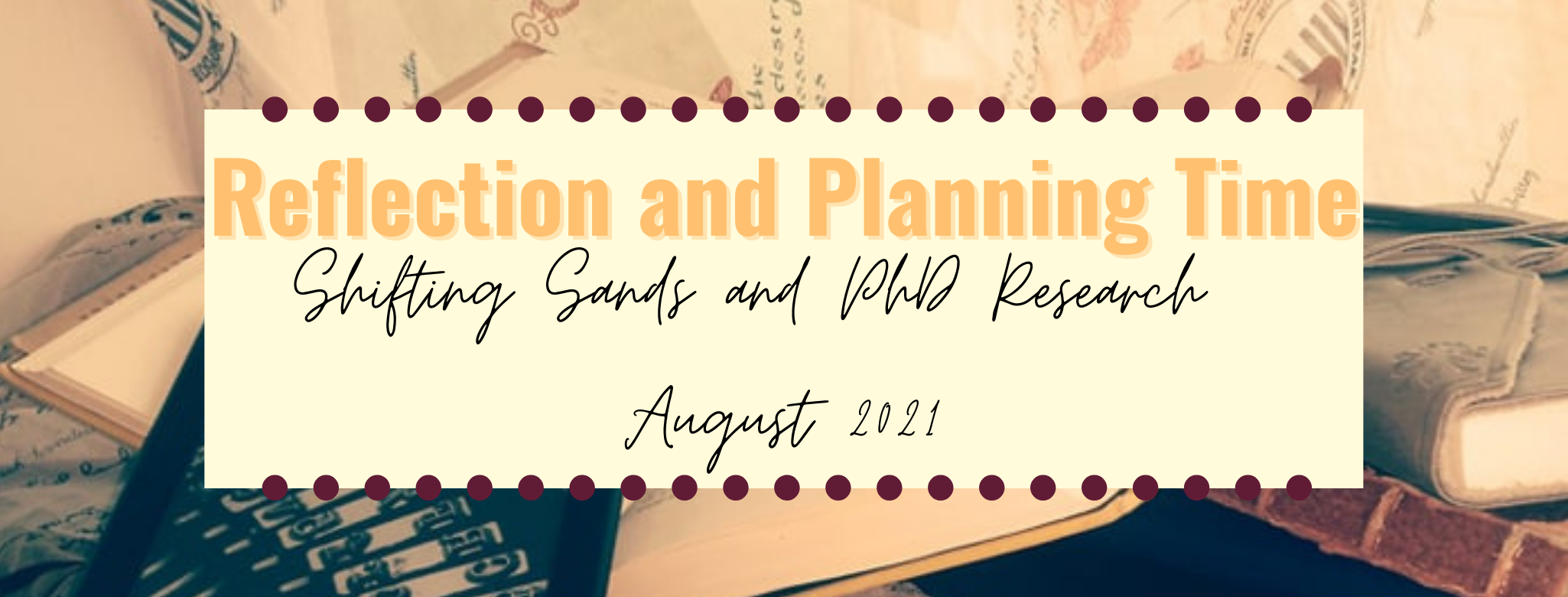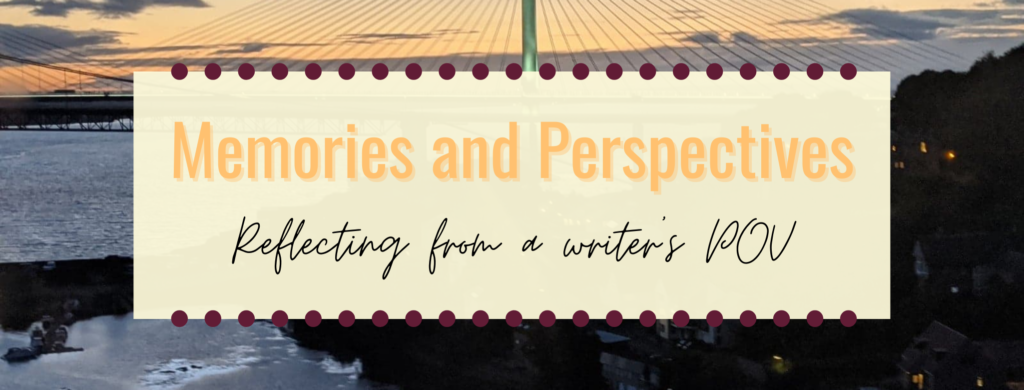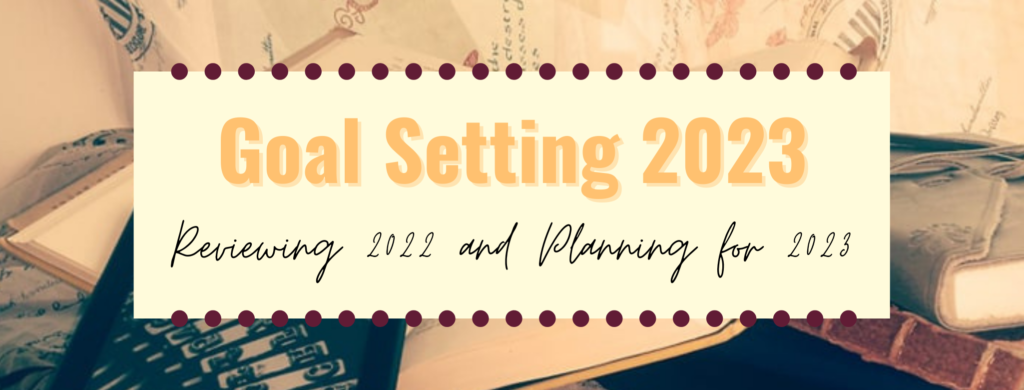Another late blog – I hope this doesn’t become a habit! I actually have about three half-drafted blog entries sitting in my saved pile but last week was full of birthdays (not mine) and family (mine). It was a much needed brain holiday after two weeks of intense PhD writing and then an academic conference week, though I am still suuuuuuper tired. Despite having those posts started, I realised last night that none of them felt quite right for this week. They’re good posts, don’t get me wrong, and I like where they’re going, but I need something else first. So much has happened in the last few months, it feels like I should take a little time for reflection and planning. And, who knows, maybe it will be as interesting to other people as it is useful to me?
Why now? It’s not the end of the year?
This obviously isn’t the first reflection or planning post I’ve done on this blog. Whether it’s writing a novel (unstable or not), or doing a PhD, some planning is required. I did a big goal setting post at the start of the year, for example. Recently though, I’ve seen a few writers doing monthly “round-ups” to reflect on their progress and it honestly seems quite useful. My friend Leah uses hers to keep track of what she’s managed in the month, what’s gotten in her way, and the (many!) cool projects she’s working on. And, while I don’t think this will be a monthly thing – unless people really want to see it? – I do see the strengths of looking at what has been done, how it turned out, and how I need to move forward. I’ve got a lot to do and much planning is needed!
Most of all, a little reflection and planning now will hopefully get my head sorted for the next chapter I have to write. Doing a PhD is kind of like doing several linked undergrad dissertations all building to a bigger whole. That’s how it feels to me, anyway. The good point in this: it’s easier to create ‘chunks’ to work on, meaning it’s at least slightly less overwhelming (until you reach editing). Bad point: I always feel a little moment of being lost after one chunk has ended. I drafted a chapter in those two intense weeks, meaning one ‘chunk’ just ended. It’s a monster chunk, pulling together lots of the thoughts and research I’ve been sorting through for months, but I can’t linger in the bliss of its completion. To quote Daniel Beddingfield, I gotta get through this!
Reflection and Planning: Shifting Sands
Shifting Sands has become the easy part! Despite a lot of turmoil at the start of the year, I think things are now moving forward well. I mean, there’s still stuff to do, but nothing high pressure.
Shifting Sands itself
The next wave will come on September 17th. I need to get the various file types ready to go in the newsletter(s) and make it pretty for the web version, but hopefully shouldn’t be too bad. I’m excited for a low-stress shift! For those who have been reading, I hope it’s all coming together for you. Who do we love? Who do we hate?
Beyond the shifts, however, I need to do more planning for book two. I know where a lot of characters are going, but writing probably won’t commence until I’ve drafted my dissertation. I can’t wait! There’s one storyline that grew unexpectedly and I’m excited to explore it. Blame Masa, it’s his fault. I also need to work out where Shifting Sands will live after PhD ends – do I keep it on here? Do I maintain the “unstable” mechanic? If I move elsewhere, is there a way to replicate it in some way? I need to figure it out. Suggestions appreciated!
The author performance
Ah, my author performance. It’s both the bane of my existence and the most interesting part of this practice-based research project. I’m approaching a year of my author self existing and the aims are still largely the same. I still want to be the “real” me but, as I’m learning, that’s a problem. I’m probably going to ramble about this more in another blog post, but our identities (particularly online) are basically fragments and social performances. To be your authentic self online is… complicated. For me, one of the biggest issues has been salience. My author brand relates to who I am as a writer, with the research side acknowledged but the writer side more important. But, in my life as a whole, the research side is just bigger at the moment. I can’t escape the fact I’m doing a PhD.
While I’ve already gathered a sample of my tweets for content analysis (which was fascinating!), the performance continues and I’m still observing myself. These blogs, alongside my private research log (that I’m bad at keeping), are kind of a record of my thoughts as they move through this. I’m trying a new thing where I’m kind of relaxing my grip on what this author self is to see where I actually feel comfortable. So far, that seems to be research-centric. Not quite what I’d hoped for (or expected!) when I first started, but definitely interesting for my examination of my author identity! It may make me less interesting to read for a general audience, but it feels more “real” for who I am right now. We’ll see if it changes closer to the next Shifting Sands update though!
Reflection and Planning: The Dissertation
I feel like whenever people hear about practice-based research, they think it’s an easier option than a fully critical dissertation. I’ve definitely encountered students who think this! The reality is that I’m probably doing more work than I ever would have if I had chosen to do a critical only dissertation. Seriously, Shifting Sands is probably now getting lumped in my appendix, meaning I’ll still have to do a dissertation that’s around 60, 000-100, 000 words. Honestly, I’m kind of glad though. I wouldn’t have gone down the paths I have without the practice, but I also have so much to talk about. I’ve written the first discussion chapter and still feel like I could expand on it!
Chapter One, done!
My first discussion chapter focuses on how authors perform their identities online. What themes run through their tweets? How do they interact with readers online? It’s been a while since I touched my literature review, so I expect some bits of this chapter will migrate, but I’m also really proud of myself. My original research question for this project wondered whether (and how) innovation – in this case, by disrupting the stability of the book – affected author identity online. And I found an answer to whether: yes! The authors I categorised as being more experimental (electronic literature authors) behaved differently online to both traditionally and self-published authors. I also found differences between the latter two groups as well, which is very interesting and gives me more to talk about.
I still have to talk to both my supervisors about it and take on their feedback, but it’s a start. My afternoon is probably going to be spent reviewing the chapter. I’ll add notes where it may need to grow, or highlight what may need to move later. I should probably also sort the references… It’s very exciting though!
Chapter Two, incoming
The biggest perk of reflection and planning is that I start to feel excited about how I’m moving forward. And, with chapter two, I’m very excited. The first chapter explores how author identity is performed online – with the second, I plan to look at how these online performances affect the text and reader. This wasn’t something I thought would be a big feature when I planned Shifting Sands, but it has become more important as I’ve moved forward. We don’t write in a vacuum, after all. Even less so with social media. Who the author is shapes how we see their writing. Barthes called for the death of the author, but the author is alive and tweeting!
To prepare for this chapter, I think I’m going to have to dive into some Genette. An author’s online presence is like an epitext: outside the book but connected to it. Compared to something like author interviews, however, an author’s social media presence is less constrained. There’s not a fixed time or subject to discuss and the internet likes to keep receipts. It means we get a clearer look at the contexts in which a book was written and the mind of the writer. And, as we’ve seen from the case of Harry Potter, tweets from the author can reshape interpretations. There’s instability beyond Shifting Sands. I’m also interested in how core parts of the author’s identity – the unchangeable bits we may previously have placed less emphasis on – play into this. Does our increased focus on author identity control which stories can be told?
The future problems
I mean, calling them a problem is probably a bit strong. I’m actually quite excited about some of it! In the third chapter, I want to take a further step out to look at how the wider industry is treating author identity. With social media seemingly becoming a contractual obligation for traditionally published authors, what does this do for the future of books? Will only authors with “marketable” personalities have a hope? I have a lot of early research to build on here, but I feel like it will be a good ‘big picture’ chapter to round everything off.
Beyond the discussion chapters, there’s a lot of reworking of my already drafted chapters to do. Methodology needs tweaking. There were some parts of the methodology that I had to adapt along the way. Practice-based research problems, you know? The literature review probably needs a complete overhaul though. The conference I went to at the end of July was pretty inspirational, but it made me realise I wanted to better define the terms I’m using in the lit review. Our traditional notion of authorship, for example, is incredibly limiting and this is worth discussing. Given the length of chapter one, I also expect the lit review to triple in size. I’m trying not to be afraid of this! I can do it!
Reflection and Planning: Overall Progress
I think I’m in a good place? The timeline I’d hoped to follow has gone out the window completely, but I’m getting there. I like the research I’ve done. I feel like it has value. And, as long as I can persuade my eventual examiners of that, what more can I ask for?



